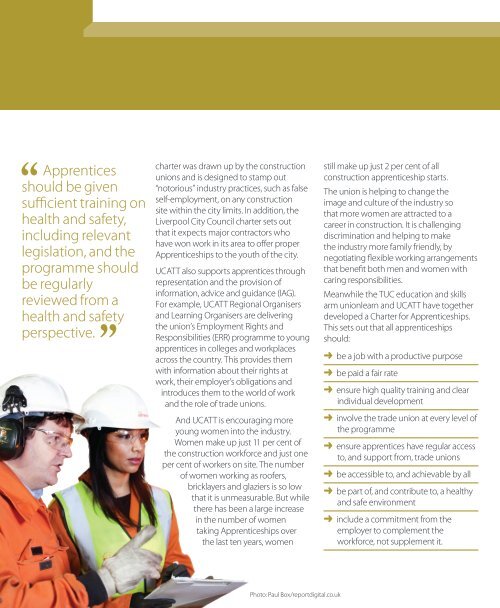TUC Apprenticeships pack inserts (7a)
Create successful ePaper yourself
Turn your PDF publications into a flip-book with our unique Google optimized e-Paper software.
Apprentices<br />
should be given<br />
sufficient training on<br />
health and safety,<br />
including relevant<br />
legislation, and the<br />
programme should<br />
be regularly<br />
reviewed from a<br />
health and safety<br />
perspective.<br />
charter was drawn up by the construction<br />
unions and is designed to stamp out<br />
“notorious” industry practices, such as false<br />
self-employment, on any construction<br />
site within the city limits. In addition, the<br />
Liverpool City Council charter sets out<br />
that it expects major contractors who<br />
have won work in its area to offer proper<br />
<strong>Apprenticeships</strong> to the youth of the city.<br />
UCATT also supports apprentices through<br />
representation and the provision of<br />
information, advice and guidance (IAG).<br />
For example, UCATT Regional Organisers<br />
and Learning Organisers are delivering<br />
the union’s Employment Rights and<br />
Responsibilities (ERR) programme to young<br />
apprentices in colleges and workplaces<br />
across the country. This provides them<br />
with information about their rights at<br />
work, their employer’s obligations and<br />
introduces them to the world of work<br />
and the role of trade unions.<br />
And UCATT is encouraging more<br />
young women into the industry.<br />
Women make up just 11 per cent of<br />
the construction workforce and just one<br />
per cent of workers on site. The number<br />
of women working as roofers,<br />
bricklayers and glaziers is so low<br />
that it is unmeasurable. But while<br />
there has been a large increase<br />
in the number of women<br />
taking <strong>Apprenticeships</strong> over<br />
the last ten years, women<br />
still make up just 2 per cent of all<br />
construction apprenticeship starts.<br />
The union is helping to change the<br />
image and culture of the industry so<br />
that more women are attracted to a<br />
career in construction. It is challenging<br />
discrimination and helping to make<br />
the industry more family friendly, by<br />
negotiating flexible working arrangements<br />
that benefit both men and women with<br />
caring responsibilities.<br />
Meanwhile the <strong>TUC</strong> education and skills<br />
arm unionlearn and UCATT have together<br />
developed a Charter for <strong>Apprenticeships</strong>.<br />
This sets out that all apprenticeships<br />
should:<br />
➜➜<br />
be a job with a productive purpose<br />
➜➜<br />
be paid a fair rate<br />
➜➜<br />
ensure high quality training and clear<br />
individual development<br />
➜➜<br />
involve the trade union at every level of<br />
the programme<br />
➜➜<br />
ensure apprentices have regular access<br />
to, and support from, trade unions<br />
➜➜<br />
be accessible to, and achievable by all<br />
➜➜<br />
be part of, and contribute to, a healthy<br />
and safe environment<br />
➜➜<br />
include a commitment from the<br />
employer to complement the<br />
workforce, not supplement it.<br />
Photo: Paul Box/reportdigital.co.uk


